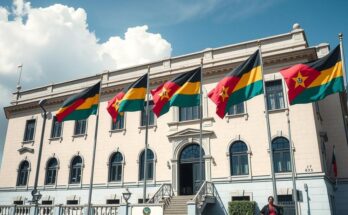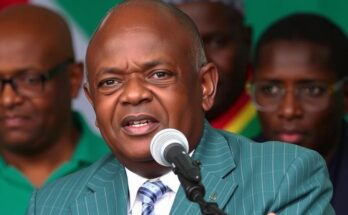Bolsonaro’s supporters celebrate Trump’s electoral victory as motivation for pursuing their own political goals in Brazil. Post-election, Bolsonaro has publicly aligned with Trump, seeking inspiration to mobilize for the 2026 elections despite being barred from running until 2030. His son Eduardo is actively building ties with U.S. conservatives, promoting a conservative media landscape while navigating hurdles imposed by Brazil’s judiciary, reflecting Trump’s contentious relationship with democratic institutions.
In Brazil, the recent political resurgence of Donald Trump has invigorated former President Jair Bolsonaro’s supporters, who perceive Trump’s victory as an impetus to pursue their own political aspirations. With an eye toward the 2026 elections, Bolsonaro, despite being prohibited from running until 2030, has aired messages of solidarity with Trump, suggesting that Trump’s return to power may inspire Brazilians to “complete our mission.” This mirrors Trump’s approach closely, with both leaders building legacies entwined with personal and legal challenges while prioritizing their families within politics. Though celebrated for his association with Trump, Bolsonaro’s path forward remains fraught with obstacles. His son, Eduardo Bolsonaro, has played an integral role in nurturing connections with influential American conservatives, thereby granting Bolsonaro’s movement access to established political strategies from the U.S. Eduardo’s endeavors include partnerships with former Trump adviser Steve Bannon, and he has steered efforts such as CPAC Brasil, which promotes values consistent with American conservatism in Brazil. In addition, Bolsonaro and his supporters have advanced their media presence, creating a self-sufficient ecosystem that disseminates conservative messages while discrediting opposing views as “fake news.” A crucial pillar of their campaign has been fostering skepticism towards Brazil’s democratic institutions, similar to Trump’s narratives. This culminated in a January 8 event where Bolsonaro’s backers stormed Brazil’s governmental centers, a reflection of comparable events in the United States. The backlash from Brazil’s judiciary has been severe, as the Supreme Court has escalated its power in response to perceived threats from political extremism and misinformation. Bolsonaro’s allies describe this as a crackdown on conservative voices, further deepening narratives of persecution. Despite potentially ongoing legal troubles, Bolsonaro continues to present himself as a pivotal figure in Brazilian politics, fueling speculation about the continuation of his influence through selected successors who may carry forth his ideologies into future electoral contests.
In the context of Brazilian politics, Bolsonaro’s strategies are heavily inspired by the Trump administration’s approach, demonstrating significant parallels in their populist rhetoric and capitalizing on political grievances. Since 2018, Bolsonaro has cultivated relationships with U.S. conservatives to bolster his political agenda and enhance his base’s perceived legitimacy through shared narratives. Following Trump’s electoral success, their alignments present a unique study of international political convergence among right-wing factions, drawing attention to ongoing judicial conflicts and public sentiment towards democratic institutions.
The apparent alignment between Bolsonaro’s political strategies and Trump’s resurgence has sparked optimism among Bolsonaro’s supporters for a potential comeback in Brazil. However, legal obstacles and ongoing investigations pose significant risks to the continuation of his influence. As Bolsonaro navigates these challenges, the future of his movement hinges on public perception, potential successors, and their ability to capitalize on emerging narratives. The outcome of these endeavors will determine whether Bolsonaro’s legacy can make a meaningful return to Brazilian politics in the coming elections.
Original Source: www.cnn.com




